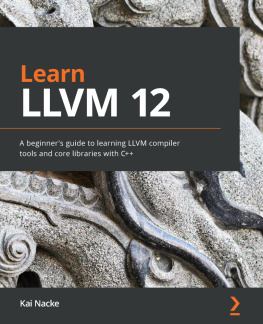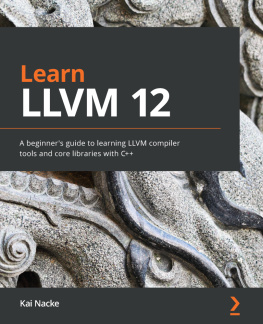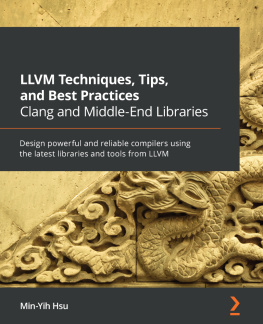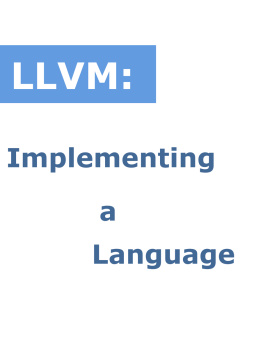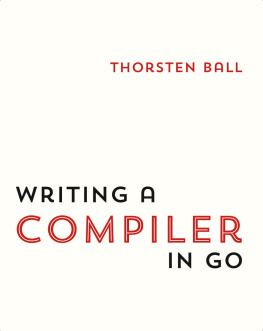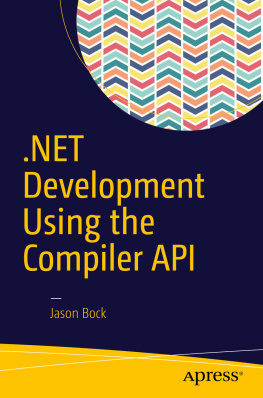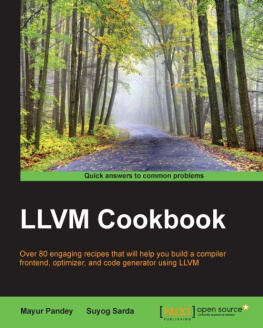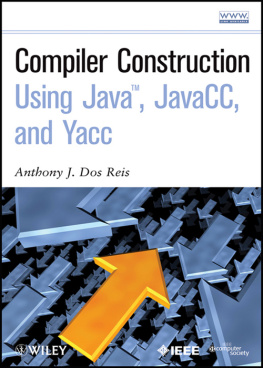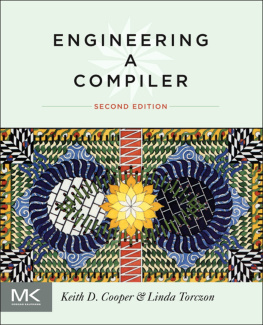Learn LLVM 12
A beginner's guide to learning LLVM compiler tools and core libraries with C++
Kai Nacke
BIRMINGHAMMUMBAI
Learn LLVM 12
Copyright 2021 Packt Publishing
All rights reserved. No part of this book may be reproduced, stored in a retrieval system, or transmitted in any form or by any means, without the prior written permission of the publisher, except in the case of brief quotations embedded in critical articles or reviews.
Every effort has been made in the preparation of this book to ensure the accuracy of the information presented. However, the information contained in this book is sold without warranty, either express or implied. Neither the author, nor Packt Publishing or its dealers and distributors, will be held liable for any damages caused or alleged to have been caused directly or indirectly by this book.
Packt Publishing has endeavored to provide trademark information about all of the companies and products mentioned in this book by the appropriate use of capitals. However, Packt Publishing cannot guarantee the accuracy of this information.
Group Product Manager: Aaron Lazar
Publishing Product Manager: Shweta Bairoliya
Senior Editor: Ruvika Rao
Content Development Editor: Nithya Sadanandan
Technical Editor: Gaurav Gala
Copy Editor: Safis Editing
Project Coordinator: Deeksha Thakkar
Proofreader: Safis Editing
Indexer: Manju Arasan
Production Designer: Roshan Kawale
First published: April 2021
Production reference: 1290421
Published by Packt Publishing Ltd.
Livery Place
35 Livery Street
Birmingham
B3 2PB, UK.
978-1-83921-350-2
www.packt.com
Writing a book is a challenging task, especially when you are planning to move to Canada and suddenly a pandemic hits the world and changes everything. The team at Packt not only provided guidance on writing, but also showed understanding for my slow writing, and always motivated me to carry on. I owe them a great thank you.
Without the support of my family, this book would not have been possible. Thanks for putting all that faith in me!
Contributors
About the author
Kai Nacke is a professional IT architect currently living in Toronto, Canada. He holds a diploma in computer science from the Technical University of Dortmund, Germany. His diploma thesis about universal hash functions was recognized as the best of the semester.
He has been working in the IT industry for more than 20 years and has great experience in the development and architecture of business and enterprise applications. In his current role, he evolves an LLVM/Clang-based compiler.
For some years, he was the maintainer of LDC, the LLVM-based D compiler. He is the author of D Web Development, published by Packt. In the past, he was also a speaker in the LLVM developer room at the Free and Open Source Software Developers' European Meeting (FOSDEM).
About the reviewer
Suyog Sarda is a professional software engineer and an open source enthusiast. He focuses on compiler development and compiler tools. He is an active contributor to the LLVM open source community. Suyog was also involved in code performance improvements for the ARM and x86 architectures. He has been a part of the compiler team for the Tizen project. His interest in compiler development lies more in code optimization and vectorization. Previously, he has authored a book on LLVM, titled LLVM Cookbook, published by Packt. Apart from compilers, Suyog is also interested in Linux kernel development. He published a technical paper titled Secure Co-resident Virtualization in Multicore Systems by VM Pinning and Page Coloring at the IEEE Proceedings of the 2012 International Conference on Cloud Computing, Technologies, Applications, and Management at the Birla Institute of Technology, Dubai. He earned a bachelor's degree in computer technology from the College of Engineering, Pune, India.

